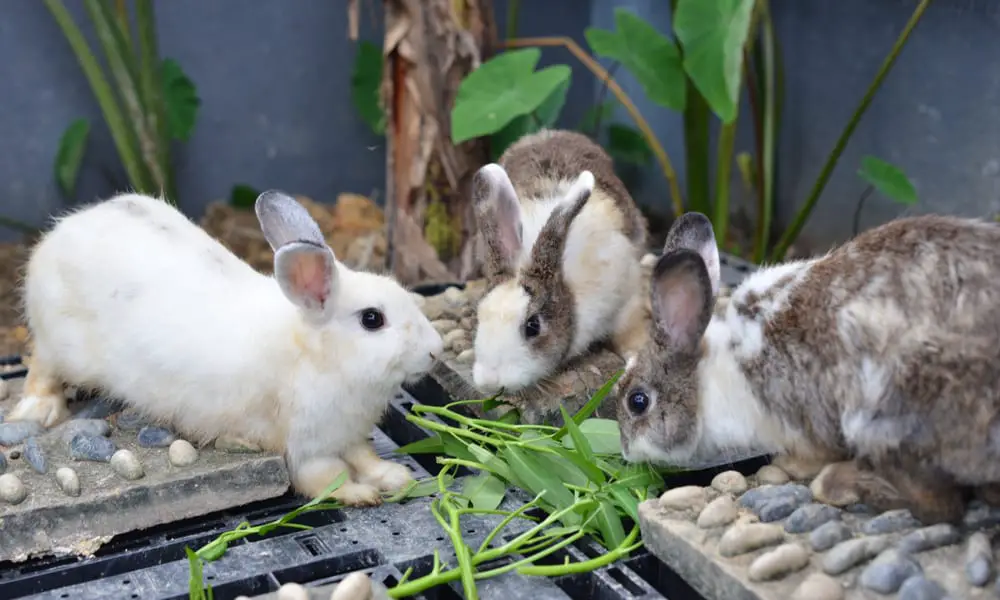A primary rabbit diet includes fresh greenery, Timothy hay, and pellets with occasionally added fruit and veggies. Since your pet bunny has a sensitive digestive system, it is crucial to determine the appropriate and healthy food you can offer.
The best fresh vegetables for your long-eared friend need to be highly nutritional. Most owners know that Romaine lettuce, carrot tops, collard greens, beet greens, cilantro, and watercress are excellent options for their pets. The question is can bunnies eat spinach, among other vegetables, and how often? Let’s see.
Table of Contents
What Is Spinach?
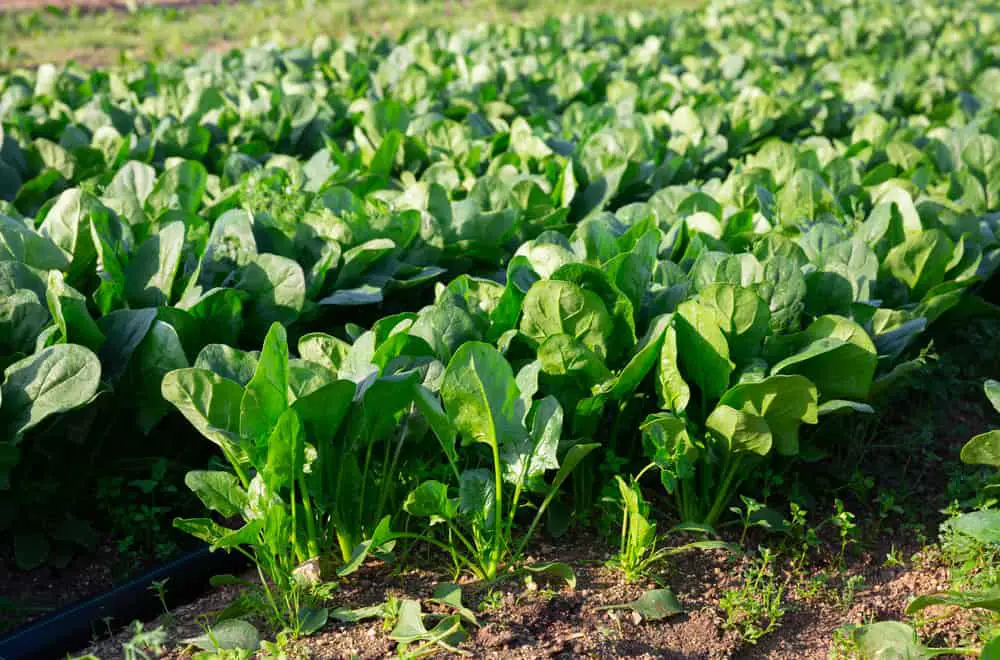
Spinach (Spinacia oleracea) is a nutrient-packed plant with dark green leaves. It is high in fiber, carbs, protein, vitamins A, B, and C, and minerals like iron and calcium. Be aware that spinach also contains 970 mg of oxalates per 100 g, which can jeopardize your rabbit’s health.
Raw spinach nutritional value for 3.53 ounces (100 g) |
|
| Nutrient | Amount |
| Calories | 23 Kcal |
| Protein | 2.86 g |
| Fat | 0.39 g |
| Carbs | 3.63 g |
| Sugar | 0.42 g |
| Fibers | 2.2 g |
| Water | 91.4% |
Spinach is rich in a few essential plant compounds, such as:
- Lutein and zeaxanthin that improve eye health
- The antioxidant quercetin that prevents inflammations and infections
- The antioxidant kaempferol that decreases the risk of cancer development
- Nitrates that improve heart health
Spinach types
You can find three spinach types on the market, including:
Savoy spinach – This plant has dark green crinkly and curly leaves. Nowadays, the most popular varieties are Bloomsdale, Viroflay, and Merlo Nero.
Semi-savoy spinach – This hybrid spinach variety comes with crinkled leaves. You should avoid offering it to your long-eared buddy.
Flat spinach – You rarely find this variety with smooth leaves, including the most popular Giant noble, fresh. Since it is often canned or frozen, it is inappropriate food for your bunny.
Raw spinach nutritional value for 3.53 ounces (100 g) |
|
| Vitamins and minerals | Amount |
| Vitamin A | 469 μg |
| Vitamin C | 28.1 mg |
| Vitamin K | 483 μg |
| Vitamin E | 2 mg |
| Folate (folic acid) | 194 μg |
| b-carotene | 5,626 μg |
| Calcium | 99 mg |
| Phosphorus | 49 mg |
| Potassium | 558 mg |
| Sodium | 79 mg |
| Magnesium | 79 mg |
| Iron | 2.71 mg |
Can Bunnies Eat Spinach?
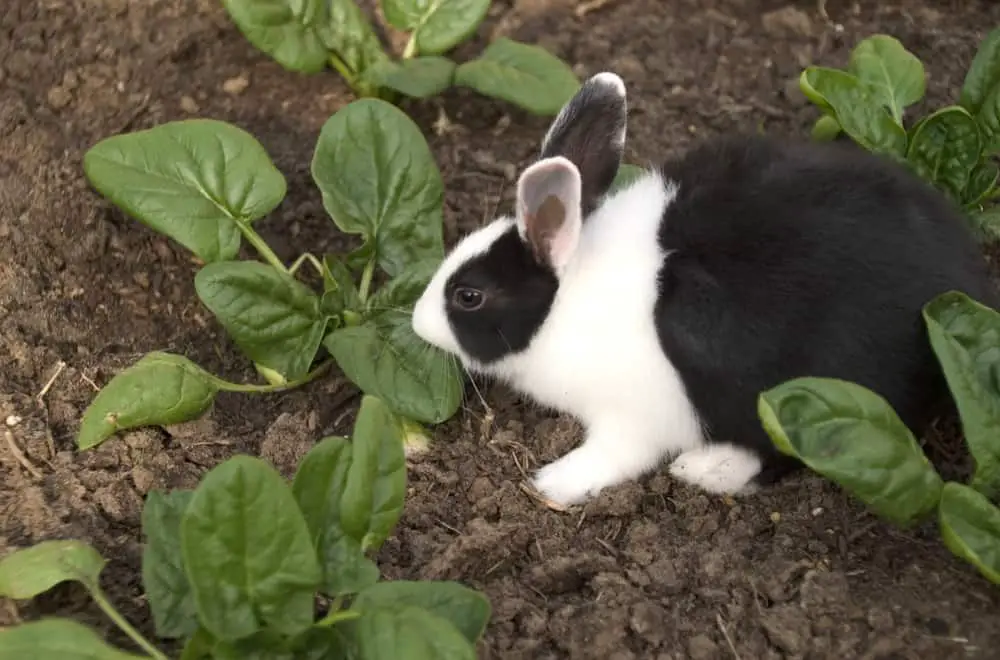
The answer to this question is complex. Most experts recommend occasionally offering washed, uncooked spinach to your bunny, while regular feeding with this ingredient can harm it. However, you should provide spinach for your bunny a few days a week during the season because of the vitamins and minerals this veggie contains.
Remember that spinach should be a treat but not regular daily food since this plant’s nutritional profile only partially matches your pet’s dietary needs. Plus, it contains calcium oxalate, a natural toxin that hinders other nutrients’ absorption.
In the long run, it may also cause skin and mouth itchiness and urinary tract issues, like bladder stones. So, you should be careful and avoid everyday feeding this food.
Take care that spinach is fresh since a wilted, slimy, and smelly plant can potentially cause a bacterial infection. Never offer cooked spinach since rabbits can’t digest it properly. Since your pet is highly sensitive to chemicals, it is necessary to wash it thoroughly to get rid of harmful pesticides.
Spinach parts appropriate for rabbits
Basically, your bunny can eat all spinach plant’s parts, including leaves, stems, stalks, and roots. Since stems and stalks are fiber-rich, they are the most beneficial for rabbits. On the other hand, roots contain higher sugar levels, so it is better to avoid them and cut them off before feeding.
Frozen spinach
Never offer frozen veggies, including spinach, to your bunny. This animal species appreciates fresh spinach and can react negatively to thawed, wilted, and fermented plants.
Cooked and canned spinach
Since bunnies can’t digest cooked food properly, you should avoid feeding your pet this way to prevent digestive problems. Canned spinach is a cooked spinach variety with high salt and water levels, making this option potentially harmful for rabbits.
Spinach treats
Offering spinach as a treat is the best option possible. Since you shouldn’t provide this veggie to your bunny daily, you can treat it as an award and a sweet treat.
Is Spinach Safe For Rabbits?
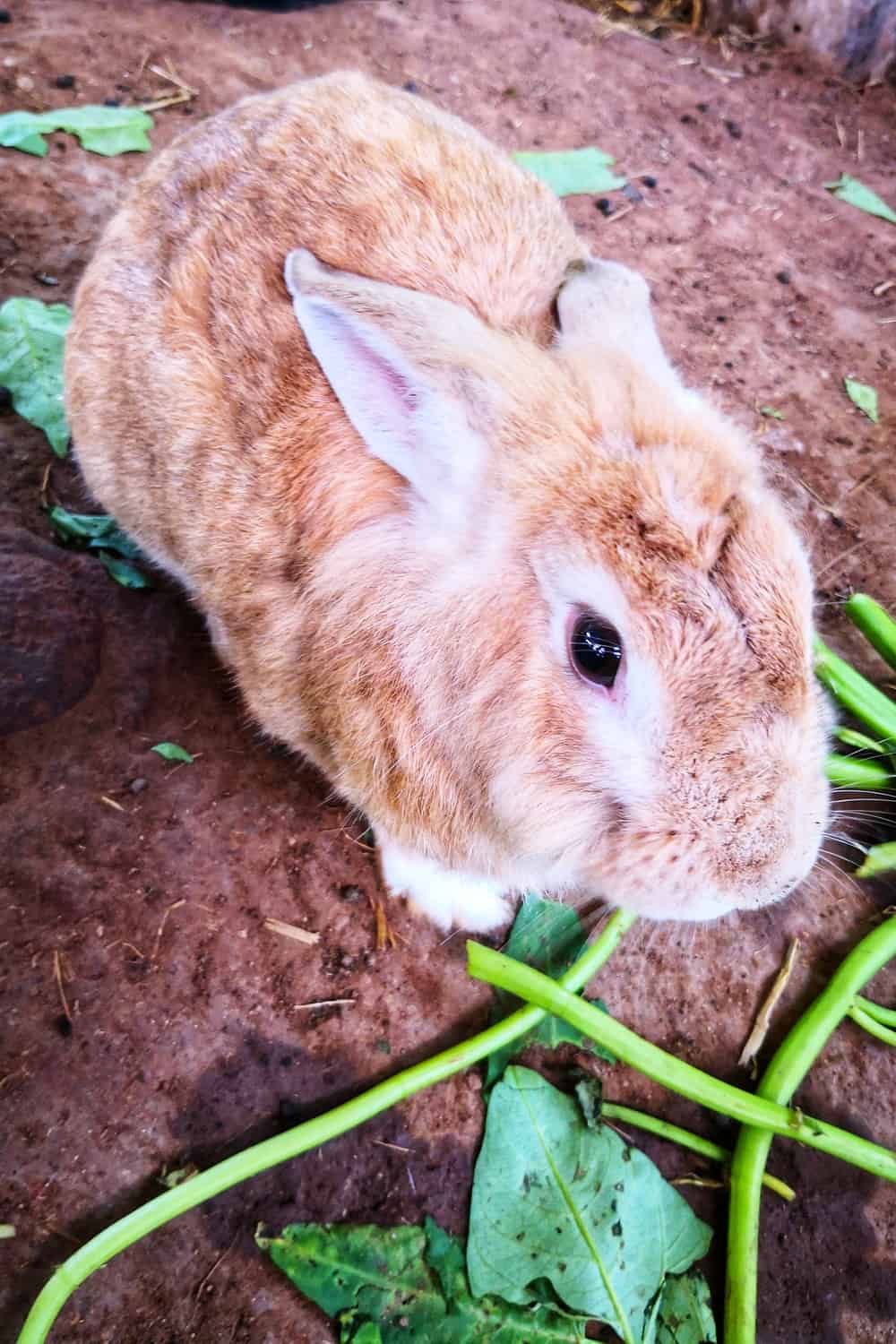
The first question is whether rabbits like eating spinach. In most cases, it depends on its taste. These concentrate selectors always choose the most nutritionally dense food first. Then, they will be interested in easy-to-digest ingredients and only then start consuming other offered food.
In other words, your bunny will eat spinach if it is the only food on the menu but will avoid it when you offer something better. However, you should count on your pet’s taste. Some like spinach and start eating it first.
Spinach plants safe for rabbits
Besides regular spinach you can find in a store, you can find other leafy greens, also known as spinach.
- Tree spinach
Chaya is tree spinach cultivated in Mexico, Florida, and Texas that is an excellent food for rabbits. It contains less water and higher fiber content, making it a non-toxic snack for your long-eared pet.
- Water spinach
Water spinach (Chinese watercress, Chinese spinach, river spinach) is a staple in Asia. Nowadays, you can find it in California, Texas, and Florida grew for Chinese delicacies.
This plant has no similarities with regular spinach and is an excellent option for rabbits when served fresh. Be careful and offer your pet only small amounts of leaves and stems. Otherwise, a bunny will pick out only leafy tips and ingest too much protein instead of necessary fibers.
- Baby spinach
Some studies show that young spinach benefits rabbits since it contains a low level of oxalates and a high pH. Unfortunately, you can only partially rely on these results because the oxalate level in baby spinach depends on numerous factors, including the soil and season.
Spinach for kits
You shouldn’t offer spinach to kits before they are at least two months old. However, some experts recommend waiting about four months before introducing this veggie to baby rabbits’ diet. Even then, it is necessary to feed your baby pet with grass hay for about two weeks before starting with fresh plants.
Spinach for wild rabbits
Wild rabbits can generally eat fresh spinach, although it is not their natural food. Therefore, always be careful and gradually introduce this veggie into their diet. Only that way will you prevent potentially hazardous diarrhea.
Spinach Benefits for Rabbits
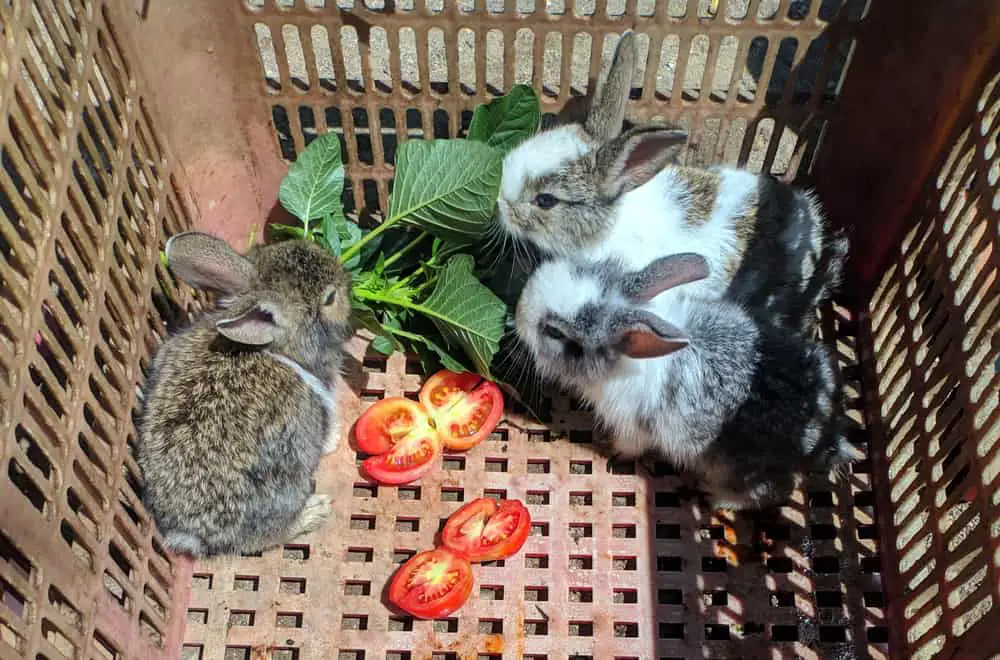
A high nutritional value makes spinach a superfood for humans, but it is not so perfect for rabbits. However, you should introduce this veggie to your pet’s diet because of vitamin A and beta-carotene to keep its immune system strong, eyes healthy, and reproductive system in excellent condition.
Antioxidants, including vitamins C and E, prevent heart diseases and lower cancer risk, while vitamin K keeps rabbits’ bones healthy. Fibers from mature spinach stalks and stems are beneficial for digestion and promote a healthy gastrointestinal tract.
As for minerals, iron from spinach maintains healthy bloodstream, while potassium and magnesium protect rabbits from heart diseases. Potassium reduces the risk of kidney stone development and prevents muscle mass loss.
Spinach Risks for Rabbits
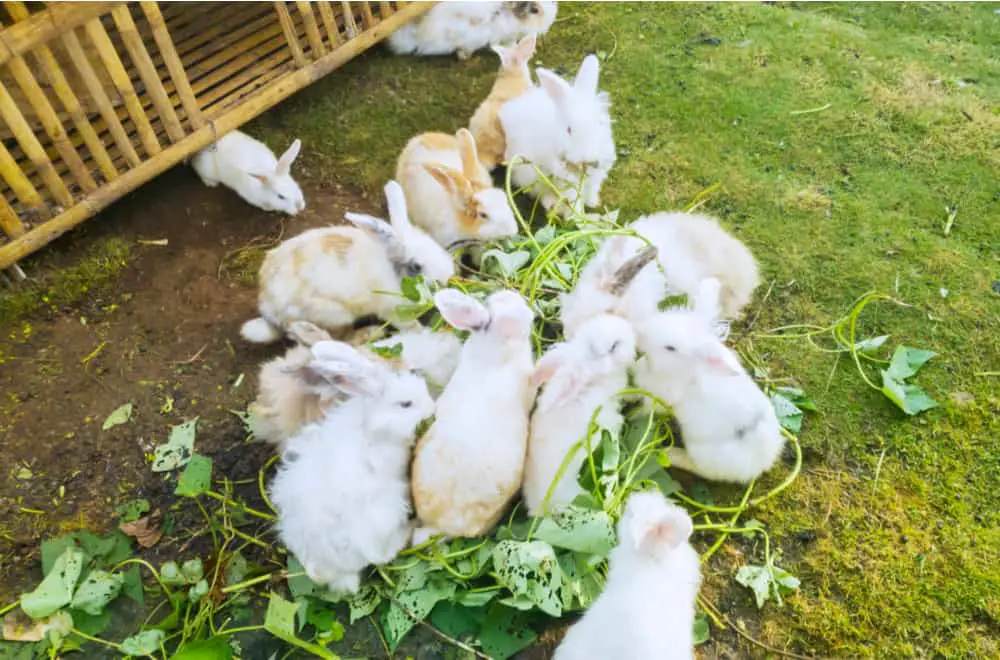
Spinach leaves contain a high water percentage, which is excellent for hydration. However, lacking fibers often causes behavioral problems, overgrown and painful teeth, and gastrointestinal diseases in rabbits. Additionally, too much vitamin C results in bladder stones.
The most severe problem is the high oxalic acid level in this vegetable. This compound binds minerals, particularly calcium and magnesium, and makes them insoluble, leading to:
- Itchy skin
- Bladder stones forming
- Urinal tract issues
Spinach quickly wilts, becomes slimy, turns yellow, quickly starts fermenting, and is susceptible to mold growth. Your rabbit will suffer from severe stomach problems after ingesting such veggies. Finally, spinach often contains pesticides and other chemicals, making this veggie harmful to your pet.
Additional Tips
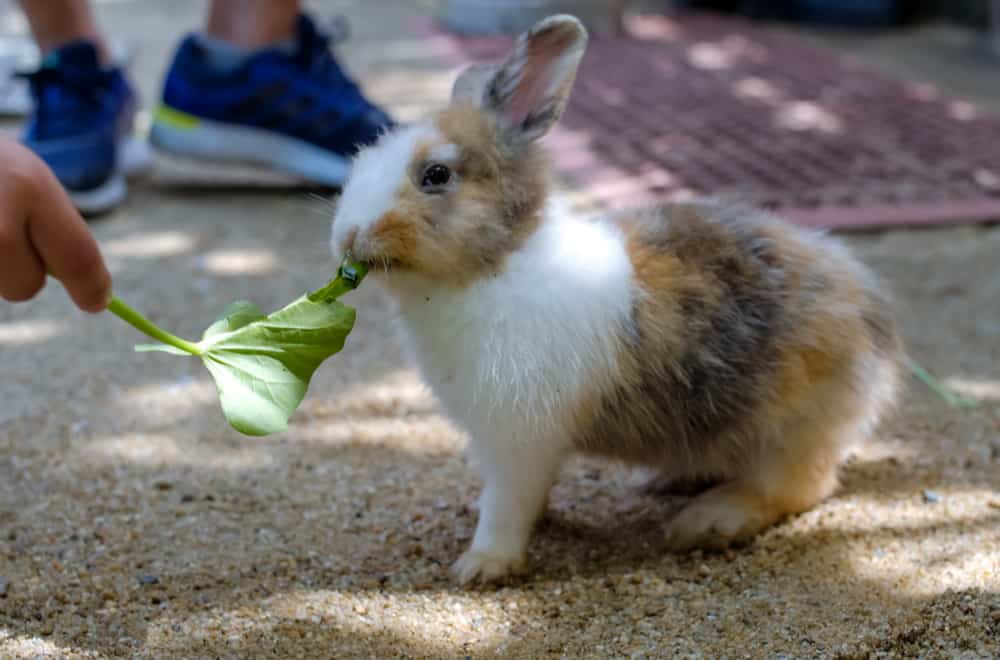
Feeding recommendations
Timothy grass hay should be the base of your rabbit diet, but you can add some greenery to its menu, either. Feeding it with 3 to 5 leafy greens a day is the best option, but changing veggie types each week is crucial.
Since variety is a key to a bunny’s health, you should combine rocket and watercress with spinach. For instance, it is recommended to offer one cup of greens per 2 pounds (0.9 kg) of its body weight each day, but spinach should be on the menu only once or twice a week.
Ingredients you can combine with spinach
- Arugula and asparagus
- Basil, mint, sage, thyme, oregano, rosemary, and cilantro
- Dill, Borage, and dandelion leaves
- Green, Romaine, and red lettuce
- Spring greens, endive, radicchio, and kale
- Collard greens, Bok Choy, and fennel
- Carrots, peppers, and cucumbers
- Clover and watercress
- Wheatgrass
Ingredients you shouldn’t combine with spinach
- Swiss chard and beets
- Radish tops
- Sprouts
- Mustard greens
- Parsley
Spinach alternatives for rabbits
- Celery
- Broccoli
- Cabbage
- Cucumber
- Pumpkin
- Strawberries
Summary
Spinach is a safe veggie for your bunny, but you should limit it to two portions per week because of the high oxalate level that prevents iron and calcium absorption. However, this greenery in moderate amounts is beneficial for your rabbit, thanks to vitamin A, fiber, and beta-carotene content.
